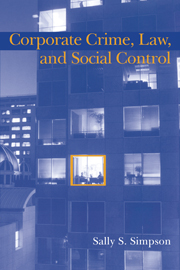Book contents
- Frontmatter
- Contents
- Preface
- 1 Criminalizing the Corporate Control Process
- 2 Deterrence in Review
- 3 Assessing the Failure of Corporate Deterrence and Criminal Justice
- 4 Corporate Deterrence and Civil Justice
- 5 Corporate Deterrence and Regulatory Justice
- 6 Cooperative Models of Corporate Compliance: Alternatives to Criminalization
- 7 Criminalization versus Cooperation: An Empirical Test
- 8 Shaping the Contours of Control
- Appendix A Study One: Questionnaire Items and Responses
- Appendix B Study One: Sample Characteristics
- Appendix C Study Two: Questionnaire Items and Responses
- Appendix D Study Two: Sample Characteristics
- Name Index
- Subject Index
1 - Criminalizing the Corporate Control Process
Published online by Cambridge University Press: 10 December 2009
- Frontmatter
- Contents
- Preface
- 1 Criminalizing the Corporate Control Process
- 2 Deterrence in Review
- 3 Assessing the Failure of Corporate Deterrence and Criminal Justice
- 4 Corporate Deterrence and Civil Justice
- 5 Corporate Deterrence and Regulatory Justice
- 6 Cooperative Models of Corporate Compliance: Alternatives to Criminalization
- 7 Criminalization versus Cooperation: An Empirical Test
- 8 Shaping the Contours of Control
- Appendix A Study One: Questionnaire Items and Responses
- Appendix B Study One: Sample Characteristics
- Appendix C Study Two: Questionnaire Items and Responses
- Appendix D Study Two: Sample Characteristics
- Name Index
- Subject Index
Summary
The modern tendency of the courts … has been widening the scope within which criminal proceedings can be brought against institutions which have become so prominent a feature of everyday affairs, and the point is being reached where what is called for is a comprehensive statement of principles formulated to meet the needs of modern life in granting the fullest possible protection of criminal law to persons exposed to the action of the many powerful associations which surround them.
images of crime in the United States at the end of the twentieth century increasingly coupled the illegal practices of business executives with those of America's underclass. These mirror images of crime and criminals have had real consequences for how crime is understood and responded to in our society today. Crime in the suites and on the streets has been indelibly linked in the public mind. It has not always been so.
Neither street nor business crime is a new social problem. In fact, quite the opposite is true. Illicit drugs and the violence they spawn have concerned moral entrepreneurs and policy makers in this country for the better part of this century; legislative attempts to curb the market powers of “robber baron” industrialists stimulated antitrust laws over a century ago. Historically, however, these populations of criminals were seen as distinct. For the most part, drug addiction (including alcohol) and violence were deemed problems for ethnics (Mexican, Chinese, Italian, Irish, and blacks) and immigrants (predominantly Catholic working class).
- Type
- Chapter
- Information
- Corporate Crime, Law, and Social Control , pp. 1 - 21Publisher: Cambridge University PressPrint publication year: 2002



